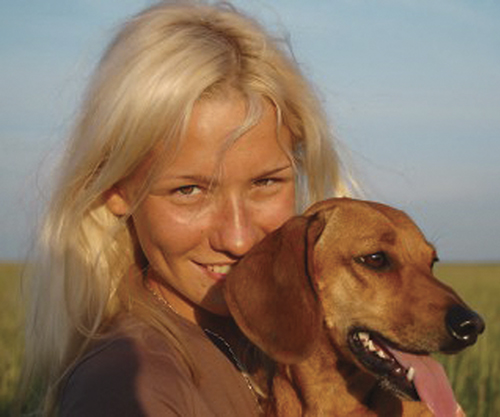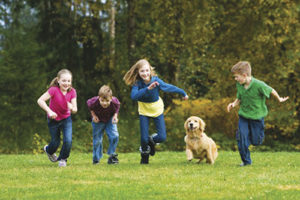 Pets – They’re Good For Your Health
Pets – They’re Good For Your Health
By Linda Fredericks
Since the first issue of Las Vegas Pet Scene Magazine hit the newsstands back in September of 2011, a recurring theme has threaded its way through the feature stories, articles, photographs and book reviews. That recurring theme, if you haven’t already guessed, illuminates the powerful benefits that are bestowed on us by our loving, loyal and beautiful pets.
From dogs and cats to horses, donkeys, birds, fish, rabbits and reptiles, the research is clear: having a pet improves our lives in quality and longevity. Actual studies at UCLA found that pet ownership corresponds to better health and fewer medical visits. Research has also shown that pet owners are generally healthier and happier than non-pet owners. Studies further reveal that just looking at animals can reduce anxiety in times of stress. For example, the simple act of looking at fish swimming in a tank can induce feelings of calmness and relaxation. This may be why many doctors have aquariums in their offices.
In Kathy Schreur’s article, “Giving an Animal a Second Chance”, (May-June 2012 Issue) she posed five important questions we can ask ourselves with regard to pet ownership. All of these provided a win-win for both the pet and the owner and further suggested that ‘fostering pets’ is a way to rescue abandoned animals; it provides a temporary loving home until a permanent loving home can be found. This act of kindness toward an animal is beneficial to our health, feels good and benefits all those involved.
The article, “They Live Among Us” about the feral cats who wander the neighborhoods of Las Vegas caused me to become more aware of the cats that roam my own neighborhood seemingly without a home. It helped remind me that my own cat, Squeaky, was once a feral cat that we began to feed and care for when she showed up at our door step.
Geri Rombach’s book review, “Animals and the Kids Who Love Them; Extraordinary True Stories of Hope, Healing and Compassion”, (May-June 2012 Issue) is yet another testament to the powerful sense of well-being that is derived from having a loving pet.
Teachers can also attest to the positive impact having classroom pets like fish, turtles, hamsters, hermit crabs or horny toads can be for young children. It gives kids a sense of responsibility to care for the pets and helps them to learn about these specific animals. Students observe first-hand how animals respond to human interaction. It creates interest and caring for pets as a natural part of learning.
In the article, “Donkey Fever”, (May-June 2012) Joan Dunkle says, ‘donkeys are like big dogs, clever and curious with great personalities’. The photographs of the donkeys at the Donkey Rescue Adoption Center clearly indicate their fun personalities. Pets like dogs, donkeys and horses get us outside, walking and riding, which has a direct impact on our health and exercise habits. Pets also require us to participate in soothing meditative activities like petting and brushing them which helps us to lower our heart rate, blood pressure and stress levels.
Our pets learn to understand what we say. At our house we have to spell the words ‘walk’ and ‘cookie’ so our dogs don’t get too rambunctious when we are about to take them for their walk or give them a doggie treat. Some breeds are said to understand up to 300 words. Birds are also very smart and can understand what is being said. Some bird species can even mimic human speech. Animals seem to have an uncanny sense of our moods based on subtle cues like body language, tone of voice and demeanor. They help us to keep our own behavior in check. We can observe the reactions of our pets when our voices are raised in excitement or anger. My dogs hide behind the couch during football and basketball season when we cheer and clap for our favorite teams. Pets are sensitive and help us to become more sensitive as well.
Some dogs have been trained to sense shifts in diseases or the aura that precedes an epileptic seizure and can warn their person or guide them to safety. Such helper dogs are trained to also spot “freezing” in Parkinson patients and with a touch of their nose can miraculously unfreeze a foot or hand. Dogs have also been trained to detect low blood sugar in diabetic patients and give a signal to correct their blood sugar before a serious reaction can occur.
 Cats are ideal pets for older people because they are low maintenance. They don’t need formal exercise and they confine their bathroom routine to a single area. Some cats have been trained to actually use a toilet bowl, now that’s genius if you ask me. Cats offer protection against certain physical conditions. Having a cat or adopting one shortly after a child is born can reduce the risk of developing animal allergies, asthma, and possibly other illnesses as well. And everyone who has ever sat with a cat cuddled on their lap, knows how soothing the touch of a cat can be.
Cats are ideal pets for older people because they are low maintenance. They don’t need formal exercise and they confine their bathroom routine to a single area. Some cats have been trained to actually use a toilet bowl, now that’s genius if you ask me. Cats offer protection against certain physical conditions. Having a cat or adopting one shortly after a child is born can reduce the risk of developing animal allergies, asthma, and possibly other illnesses as well. And everyone who has ever sat with a cat cuddled on their lap, knows how soothing the touch of a cat can be.
Pets are remarkable for their capacity to love us unconditionally. They bring us good cheer, humor and companionship on a daily basis. My dogs run out to greet me and do the happy dance everyday when I pull into the driveway. Pets improve every aspect of our lives, from their examples of love, optimism, compassion and goofiness, they are good for our health. Pets make us more human. I appreciate how reading all of the Las Vegas Pet Scene Magazines this past year has made me more aware of the wonderful benefits I enjoy from having pets.

Pets & Children
- They can be safe recipients of secrets and private thoughts. Children often talk to their pets, like they do their stuffed animals.
- They provide lessons about life; reproduction, birth, illnesses, accidents, death, and bereavement.
- They can help develop responsible behavior in the children who care for them.
- They provide a connection to nature.
- They can teach respect for all living things.
